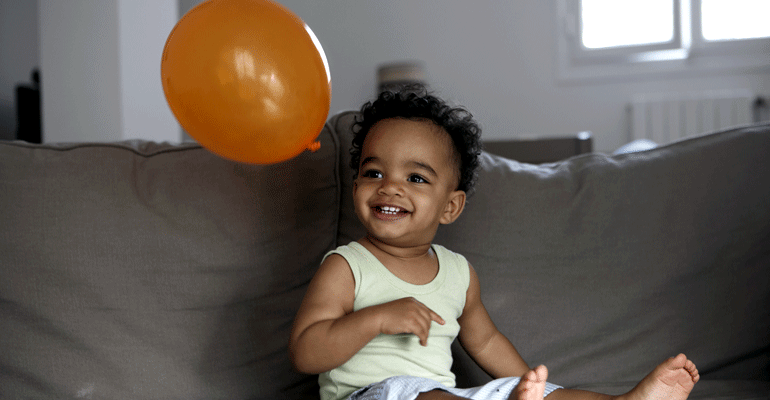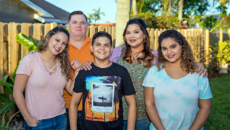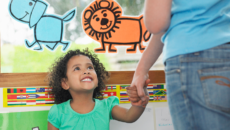Beginnings
Weeks, months, years…no matter how long the wait, families get creative when welcoming new arrivals.
When Melanie, of San Rafael, California, brought home her newborn son, Gavin, her friends were eager to welcome him. “One hosted a baby shower at her home, when Gavin was two months old. I think half the county was there!” says Melanie. “So many people supported me prior to Gavin’s adoption, and they all wanted to share in the excitement.” Melanie took home a special memento from her shower: The host had included a square for a baby quilt in each invitation, instructing the guests to bring their decorated squares to Melanie’s shower.
Baby showers serve several purposes: to provide supplies for a child and to give family and friends a chance to show support for the parents — and to start building a connection with the newest family member. First-time parents, in particular, may have several showers — one with friends, one with co-workers, and one at the family’s place of worship, for example. Increasingly, families who adopt domestically also include birth mothers and their relatives in the festivities. “When we adopted our son, his birth mother’s aunt gave me a baby shower,” says AF reader Stephanie Case. “There were wonderful gifts and keepsakes from his birth family that I will take pride in giving my son someday.”
The timing of a shower depends on the type of adoption and the family’s preferences. International adopters typically have a good idea of their child’s arrival date, making a shower held in advance of the arrival an option.
Tina Dammeyer’s mother and sister-in-law hosted a shower for her after her first adoption trip to Russia (but before her son, Matthew, came home). “The shower helped take our minds off the five-week wait between our two trips,” says Dammeyer. And because she had met Matthew, she was able to tell gift-givers his size. “Matthew was eight months old when he came home,” she says. “It helped to receive age-appropriate clothes and toys.”
Adoptive mom Lisa Milbrand took the opportunity to involve her guests in giving back to the people who had cared for her daughter, Katie, during the first months of her life. “My mother asked all the guests to bring things to donate to the orphanage. We filled a large duffel bag with bottles, medication, and blankets.”
A shower or welcome-home celebration after the baby arrives can be an especially joyous event. “Once everyone met our son, they were eager to shower him with gifts,” says AF reader Marita Collins.
Because of the uncertainties associated with the process and time frame, many families who adopt domestically are hesitant even to shop for baby gear, much less plan a shower, before the baby comes home. “I had nothing when I came home with the baby, except a diaper bag, a couple of sleepers, and bottles,” says AF reader Renée Czaplicki. “My friends and coworkers threw a shower that week. It was quite a welcoming for my son!”
An Act of Trust
Entrustment ceremonies offer families in open adoptions a way to cement their bond.
New parents Heather and Robin received their son, and the blessing of his birth mother, in an entrustment ceremony held at their church. “It was a beautiful and meaningful celebration,” Heather says.
The entrustment ceremony is a relatively new ritual that honors all the relationships in an open adoption. Coley Strickland, co-founder of the online support group BirthMom Buds, says that such ceremonies are becoming common in domestic adoptions. “We suggest one for almost all of our expectant moms, because it makes [the giving and receiving of a child] more emotional and spiritual, something to remember and cherish,” she says.
An entrustment ceremony is usually held during the week following a baby’s birth, and it is separate from the signing of legal papers. It may be held in a home, hospital chapel, or church, where a member of the clergy may preside. The birth mother and adoptive parents usually plan the ceremony together.
Typically, the ceremony begins with the birth mother holding the baby. She then hands the baby to the adoptive parents, a gesture symbolizing her entrusting them with the child. The birth mother may read a message to the baby, expressing her love and explaining why she is placing him for adoption.
One birth mother, Abigail, recalls her ceremony in an article at birthmombuds.com: After reciting the lyrics to “Forever Young,” by Bob Dylan, she and the adoptive parents read short messages they had written to each other and to the baby.
Though the core of the ceremony will vary based on preferences, many will include all the parents lighting a candle together and reading significant poems or prayers. “On the Wings of a Prayer,” by Lisa Bote-Phillips, and “Tiny Footprints,” by Jeannette Minnich, are common choices.
Music is also an integral part of these ceremonies. “‘From God’s Arms to My Arms to Yours,’ by Michael McLean, is very popular,” says Strickland.
Ceremonies often close with the adoptive parents promising the birth mother that they will love and cherish the baby forever, and that the families will maintain an open relationship. Rebecca Weller, a mom in San Francisco, made keepsake boxes for the birth parents. “Each box contained the text of the ceremony, our names and address, and a pre-paid phone card,” she said.
A similar ritual in international adoption is the Giving and Receiving Ceremony, the last official step in adoptions from Vietnam. This governmental ceremony is attended by both the adoptive parents and the birth mother. The documents signed at this ceremony finalize the adoption.
Proceedings differ from province to province, but, often, the presiding official gives a short speech about the new parents’ responsibilities, and the adoptive parents are given an opportunity to speak with the birth mother through a translator.
Now a Family, Always a Family
Finalization is the last legal step in becoming a family — and a deeply emotional day for parents.
When Reagan Baker and her husband finalized their son’s adoption from South Korea, they capped it off by celebrating with a dozen guests at their home.
“That was a big, emotional day for us,” she says. “Family and friends who attended the early-morning hearing at the courthouse joined us for breakfast afterward. I made the outfit our son wore for the day, using a cloth with a red-white-and-blue pattern. It was embroidered with the initials of his Korean and American names, and with the yin-and-yang symbol from the South Korean flag.”
The timing of the finalization commemoration depends on the adoption route. In domestic, and some international adoptions (from South Korea and India, mostly), the finalization hearing at home is the last step in the process. After the court approves the parents’ petition to adopt, the adoption is recorded and a new birth certificate is issued for the child. For other countries, including Russia and China, adoptions are finalized in the sending country. Nonetheless, some families choose to readopt under the law of their state.
“Finalization Day is often the day that adoptive parents feel that they are the legitimate parents of the child,” says Ellen C. Singer, a social worker at the Center for Adoption Support and Education in Silver Spring, Maryland. “There’s the legal, and then there’s the emotional. Does the legal impact the emotional? I think it does.”
That was certainly true for adoptive mom Eliza Newlin Carney. She calls her daughter’s finalization hearing “one of the more memorable milestones in our adoption journey,” and remembers wiping away tears at the judge’s concluding statement: “I always like to reflect on the fact that, when we come into this world, we don’t pick our parents and our parents don’t pick us. In adoption it’s a little different. The adopting parents so love the child that they go to a great deal of trouble to seek out the child, to have that child become theirs.”
Naming & Rites of Passage
Ceremonies and other meaningful ways to welcome a child into a family.
Many religions have ceremonies — blessings, baptism, naming, and others — to welcome a child into a family and into the community. Families often incorporate readings or songs that reference adoption into the traditional proceedings.
After Rani, adopted from India at three, joined Tamra and David Hyde’s family, she participated in several ceremonies at her parents’ place of worship.
“‘Rani’ is the name she was known by in India, and we gave her the name ‘Ahrana Zilpha,’ which means ‘radiant angel of light,’” says Tamra. “For her naming and blessing ceremony, we brought her before the congregation, and her father gave her new name to her, along with a blessing and wishes for a bright future.”
In another ceremony, held later at their local temple, “Rani was sealed to our family for all eternity. This was a special time for the entire family; young children don’t usually attend temple ceremonies,” explains Tamra. “But Rani’s siblings all attended this one.” For both ceremonies, Rani wore a white dress patterned after an Indian choli that was made for her by her grandmother.
The guest of honor will often wear special attire for the ceremony. Parents may dress a baby in an heirloom christening gown, which ties the child to previous generations of the adoptive family. A relative might sew an outfit for the child, putting love and hope into every stitch. Children adopted internationally may wear clothing from their birth culture, which can be stored as heirlooms for future generations.
Honoring Parents
Mother’s Day and Father’s Day are joyous celebrations — and reminders that every adopted child has two sets of parents.
Many adoptive moms and dads wait a long time to become parents, so Mother’s Day and Father’s Day are especially sweet occasions for them (see “My First Mother’s Day or Father’s Day”, below). Last year, Cate Maidlow celebrated her first Mother’s Day with her daughter, Audrey. She and Audrey wore their prettiest dresses, and her husband, Mark, took them out for brunch. “I felt special all day, and it was a little surreal for me,” she says. “I felt like I was floating through the day. I felt relief that I didn’t have to suffer through another day that celebrated what I could not have — because I finally had it! I was so grateful to be the mother of this amazing child.”
Many parents can’t help thinking about their child’s birth parents on Mother’s Day. “I share this day with another woman: my daughter’s birth mother. I wish I could tell her how grateful I am,” says Maidlow.
Families involved in open or semi-open domestic adoptions often observe Mother’s Day or Father’s Day by sending a memento or photograph to the birth parents. Angela Ferensic and her son, Anthony, have a special annual project. “Every Mother’s Day, I send my son’s birth mother his handprint,” she says. “We trace his hand on colored paper, write his name and age on it, and have him color it. Then I cut it out, so it’s the shape of his hand, and send it with a note. I thought she would appreciate being able to compare his size from year to year.”
Some families in international adoptions light a candle, say a special prayer, or release a balloon bearing a note to an absent birth mother. Beth Roth’s children light candles and place flowers in a heart-shaped vase, and Roth reads aloud letters they’ve written to their birth mothers.
“On each of my children’s birthdays and adoption days, we make sure to acknowledge their birth parents,” says Martha Crawford, who adopted her son and her daughter from South Korea.
“We also give a financial gift to a support program in Korea, for single mothers who are trying to raise their children. We hope this will give other women in Korea choices our children’s birth mothers did not have,” adds Crawford. “We make this gift each year, on their adoption days, to honor the absent birth mothers in our family.” Another opportunity to honor a child’s first parent is Birth Mother’s Day, observed on the Saturday before Mother’s Day. Some birth mothers, however, prefer to be remembered on Mother’s Day, rather than by a separate holiday. Adoptive parents should ask the birth mother about her preference.
Happy Anniversary!
Family Day, Gotcha Day, Adoption Day — whatever you call it, the day you become a family holds a special joy for all adoptive parents.
We celebrated our first Family Day in January,” says Kara Peek, mom of Kaleb, in Neenah, Wisconsin. “We chose the date we first held our son, and we celebrated by having friends over for cake and ice cream. This spring we will plant a tree in our yard. It will be fun to watch it grow over the years!”
There are as many ways to celebrate the anniversary of a child’s adoption — whether you call it Family Day, Adoption Day, Gotcha Day, or something unique — as there are families. The occasion might mark the date parents met their child, the date they brought her home, or the date the adoption was finalized. “I debated whether to celebrate the day she became a part of our family or the day the judge made it final,” explains AF reader Sharon Palmer. “I decided on the former, and we call it ‘Angel Day,’ as that was the day the angels brought us together. Each year, we give my daughter, Nivianna, a new angel for her collection, and then have a special dinner.”
Parents who travel to adopt often purchase gifts from their child’s home state or country to give to him on his adoption anniversary each year. Cara Bach and her husband adopted Victoria from Russia. “Since our adoption day is the day after Christmas, we gave her a tree ornament that we bought in Russia. We bought enough of them to give her one every Christmas until she is 18,” says Bach.
Adoption anniversaries can be a time for families to reunite with travel mates. Donna Kirkwood traveled to China with a group to adopt her daughter four years ago.
“Each year our nine families celebrate Gotcha Day together,” she says. “We gather at someone’s house, everyone brings food and gifts for the girls, and we have a great time talking, reminiscing, and laughing, while the girls play together.”
Some families prefer low-key celebrations. Lynda LaCoste, of Colorado Springs, Colorado, has one daughter who was adopted internationally and another on the way. “Adoption Day is special at our house. I take the day off work, and we have ‘just us’ time during the day, doing stuff we enjoy,” she says.
Some children enjoy a quiet dinner at a favorite restaurant in lieu of a noisy party, especially as they move into their teens, when a big fuss seems less “cool.”
Adoption celebrations are an opportunity for families to build their own traditions. Denise Hoppenhauer and her husband, of Greenville, South Carolina, adopted Callie and Sean from Russia. “We celebrate Adoption Day, but in our own way, which is a twist on Russian Name Day or Saint’s Day celebrations,” says Hoppenhauer. “We call ours ‘Happy Callie Day’ and ‘Happy Sean Day.’ Each child gets to pick a favorite restaurant for dinner, and we read his or her own adoption story, which we wrote in rhyme.”



